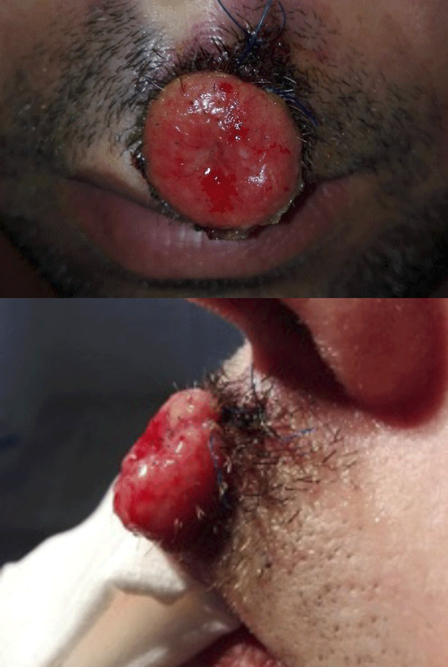A 41-year-old male presented with a 4 cm nodular, vegetating and ulcerated lesion of the upper lip, with two weeks of evolution (Fig.s 1 and 2). Biopsy revealed primary cutaneous anaplastic T-cell non-Hodgkin's lymphoma (pc-ALCL). The immunohistochemical study revealed CD30 positivity and ALK negativity, and the CT staging showed localized disease only, LDH was high and bone marrow biopsy revealed no alterations - stage I-A. He underwent radiotherapy and chemotherapy with CHOP, with regression of the upper lip lesion. After 6 months, there was appearance of non-characteristic scattered skin lesions on the trunk and limbs, from papules to ulcerated nodules with <2 cm, associated with B symptoms, whose biopsy was compatible with recurrence. He then underwent second-line treatment with etoposide and subsequent autologous bone marrow stem cell transplantation. Four months after transplantation, he presented a new recurrence of cutaneous lesions, histologically compatible with lymphoma recurrence. Since the lesions disappeared spontaneously, leaving only a residual hyperpigmented smear and occasional itching, without B symptoms and, as both the PET-scan and the bone marrow biopsy did not show alterations, only clinical surveillance was decided.
ALCL represents mature T-cell neoplasms that express the lymphocyte activation marker CD30.1 They can be grouped based on the expression of the ALK marker (positive or negative) and by clinical presentation (systemic or localized).1 Localized forms of ALCL include primary cutaneous (pc) ALCL and breast implant-associated ALCL (BIA-ALCL).1
Pc-ALCL accounts for 8% of cutaneous T-cell lymphoma (CTCLs); it is seen mostly in adults, with males diagnosed more often than females.2 Clinically, pc-ALCL presents with nodular cutaneous lesions measuring over 1.5 cm usually in the face, trunk, extremities and buttocks.3 Although the majority of the patients present with solitary or localised nodules or papules that may demonstrate ulceration, multifocal lesions are see in 20% of patients.3 These lesions may have partial or complete spontaneous regression, but in 10% of the patients, extracutaneous dissemination occurs, which usually involves lymph nodes.3 Patients with pc-ALCL have an excellent prognosis, with a 5-year disease-specific survival over 90%.3
















